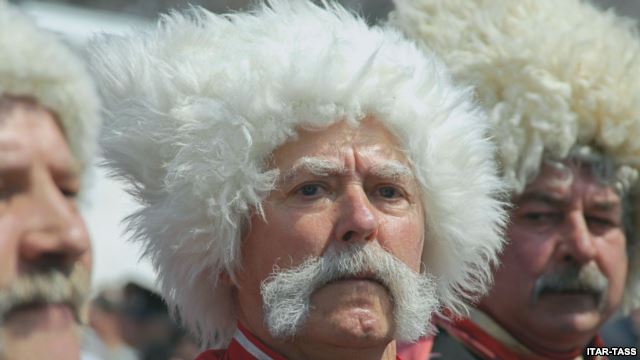
Cossacks Expect State Aid, but Express Disappointment With Government
Publication: Eurasia Daily Monitor Volume: 11 Issue: 37
By:

A large rally of Terek Cossacks took place in the city of Vladikavkaz, North Ossetia, on February 16. The Cossack organizations stated they would join forces with other ethnic-Russian organizations to thwart the draining of the ethnic-Russian population from the North Caucasus (https://www.apn.ru/publications/article31077.htm). “Gathering the Cossacks into a firm fist is necessary to show the extremists that the Russians will not leave the North Caucasus,” the Cossack leaders said. In particular, the Cossacks are worried about the flight of ethnic Russians from the eastern part of Stavropol region (https://www.ng.ru/regions/2014-02-04/5_kazaki.html).
Despite their expansionist statements, the Cossacks appear to be worried about losing their existing positions in the North Caucasus rather than gaining new ones there. The recent killings of six people in the southern districts of Stavropol region alarmed the Cossacks. On January 8, locals reported the deaths of people in the Kirovsky and Predgorny districts of Stavropol region, which are adjacent to Kabardino-Balkaria. Because improvised explosive devices (IED) were found at the sites of the murders, the law enforcement agencies declared that militants were behind the killing. All victims were of “Slavic ethnicity,” according to reports, and were killed with the same kind of weapon—a Makarov handgun. Three possible suspects, members of the insurgency in Kabardino-Balkaria, were named, but they have not been apprehended by the police since then (https://www.rg.ru/2014/01/09/reg-skfo/versiya.html).
The Cossacks saw the murders as an attempt to drive ethnic Russians from the area. “Events in the Predgorny and Kirov districts of Stavropol region are clearly designed to harass the ethnic Russian and Slavic population, so that Russians leave the [North] Caucasus, [and] sell their homes,” declared the chief of Terek Cossacks, Mikhail Inkavtsov. “We must set up self-defense groups” (https://www.ng.ru/regions/2014-02-04/5_kazaki.html).
Even though the so-called rebirth of the Cossacks started soon after the demise of the Soviet Union in 1991, the Terek Cossacks now say that they have achieved little in the past two decades. The new generation of Cossacks is reportedly demanding a “combat mission” so that the Cossacks and ethnic Russians in the North Caucasus can rebound. The chief of the Terek Cossack Military in Vladikavkaz, Viktor Kushnaryov, noted that the Cossacks were unhappy about the lack of government support. In his words, this responsibility was essentially shifted from government structures onto the shoulders of ethnic Russians themselves. So, by “government support for people,” the Cossacks mean government support for ethnic Russians and Cossacks. The Cossack chief also criticized Cossacks who—in his view, due to their “faintheartedness”—are “not prepared to provide true support to their brothers in other regions and republics.” According to Kushnaryov, this timidity resulted in the exodus of Cossacks from Chechnya (https://www.apn.ru/publications/article31077.htm).
Ethnic Russians comprised 25 percent of the total population of Chechnya in 1989, and over half of the population of Grozny was made up of ethnic Russians. Approximately a third of the population of the city of Gudermes and the Naur and Shelkovskoi districts were Russian. After two devastating wars, the ethnic Russian population in Chechnya was reduced to less than 4 percent, but it is hard to blame the lack of Cossack support for their brethren on this reduction. Despite the formal equality of all ethnic groups in Russia, ethnic Russians certainly are treated by the central government as “more equal” than others. Visiting the Chechen Republic in February, Alexander Zhuravsky, the director of the department for development of inter-ethnic affairs at the Ministry for Regional Development, gave assurances that the ministry was paying close attention to the state of ethnic Russians and Cossacks in the North Caucasus and promised government financial support for programs run by Cossacks (https://www.grozny-inform.ru/main.mhtml?Part=11&PubID=48923).
Interestingly enough, despite years of verbal and financial government support, the Cossacks never became a significant force in the North Caucasian republics. Part of the reason is that Moscow itself did not want the Cossacks to become a serious force. The first chief of the Terek Cossacks, Vladimir Shevtsov, complained that the Russian government feared “any organized force, including the Cossacks” (https://www.apn.ru/publications/article31077.htm).
At the same time, the Cossacks’ revival was seen with suspicion by the North Caucasian republics, although their leaders rarely indicated that. Instead of directly confronting the Cossack movement, which has apparently been supported by the Russian government, the North Caucasian republics used various tactics to hold the Terek Cossack forces back. For example, in North Ossetia, the regional authorities organized their own Alan Cossack Military, claiming that ethnic Ossetians served in Cossack forces in the past (https://gardva.narod.ru/skv/t/s/s009.html). The authorities in Ingushetia also organized their own Ingush Cossack forces (https://srn.su/?p=1086).
Some, republican leaders, meanwhile, were able to co-opt and influence the chiefs of the Cossacks in their republics. The chief of the Kabardino-Balkarian Cossacks, Igor Logvinenko, rejected the idea of the recent Cossack rally in Vladikavkaz, which called for all Cossacks in the South of Russia to join forces, saying that his organization was strong enough without reinforcements (https://www.regnum.ru/news/polit/1769627.html).
Having lost the status of the only “legitimate” Cossacks in the North Caucasus, Russia’s Cossacks today have isolationist goals, such as separating predominantly ethnic-Russian Stavropol region from the North Caucasian Federal District and abolishing the district altogether. The Cossacks want to protect Stavropol region from the influx of ethnic non-Russians from the North Caucasus and demand that Moscow provide assistance to the Cossacks and ethnic Russians. Thus, even the force that Moscow traditionally used to control the North Caucasus is turning against it, demanding that the North Caucasus in essence be separated from Russia.




